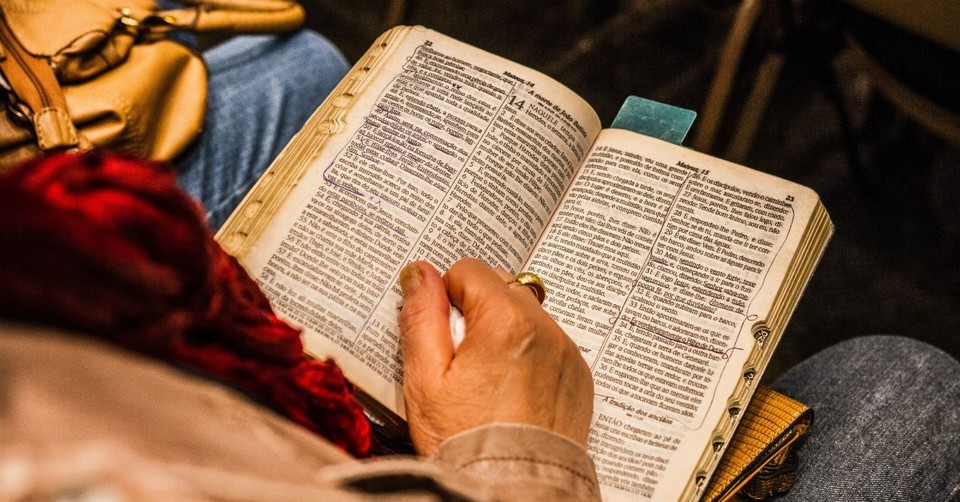8 Principles from Scripture (and God's Character) to Strengthen Prayers

Many years ago, when my wife Jeana was diagnosed with cancer, it was a wake-up call for us. At that time we had two young boys, a large and growing church, and a great life. But when cancer struck my 35-year-old wife and led to surgeries, ruthless chemotherapy treatments, and additional radiation treatments, our lives turned upside down.
This crisis did not drive us away from God but to God. It changed both of us and shaped our life together.
On the overcast morning of her initial diagnosis, I remember walking into our home, getting on our knees together, and crying out to God. I don’t remember the exact words we prayed, but they were not processed and refined. Honesty before God, with fear we had never known before, poured out of our hearts. Fears and tears eventually turned into faith and peace.
Photo Credit: Pexels/Eduardo Braga

Never the Last Option
When this crisis unexpectedly entered our lives, we chose prayer. We depended on God, not just this time, but again and again when fear would stop us in our tracks. Even after the surgeries and treatments, and even when the reports became encouraging, we still had moments of doubt and fear. In each of those times, prayer became our first choice, not our last option.
Prayerlessness must not prevail. Each follower of Christ needs to pray with confidence, and each church needs to pray with power. As we depend on God personally and collectively, we will grow in our walk with the Lord daily. I believe this is only possible when we stand on God’s Word as we pray, knowing that God has given us prayer as a means of communication with Him. God’s Word has given us multiple illustrations that one kind of prayer does not fit all instances.
Photo Credit: Unsplash/Alvin Mahmudov

Prayer Is Grounded Upon Deep Theological Truths
The foundation of a building often goes much deeper than what’s on the surface. We see the concrete of the structure. Yet, deep below lies the evidence of work that took hours, days, and weeks. The bigger the structure, the deeper and broader the foundation must be.
The same principle applies to prayer. Beyond what we see with our human eyes, the depths of God’s Word contain deep theological truths that shape our lives and perspectives.
We can pray with confidence, built on God’s character:
Photo Credit: Thinkstock/B-C-Designs

1. Sovereignty of God.
God is over all, in all, and through all. God is supreme in rank and rule in this universe and beyond. He is God. He has no beginning or ending. God is involved in the affairs of this world and the details of our lives.
2. Trinity of God.
God is One in three divine persons: Father, Son, and Holy Spirit. As Father, He knows our needs and cares for us deeply. As Son, He died for us to be saved from our sin. As Holy Spirit, He empowers us to live the Christian life. We pray to the Father in Jesus’ name and do so in the power of the Holy Spirit.
Photo Credit: Unsplash/Alexandru Tudorache

3. Power of God.
God is all-powerful. God is able! When we believe in the power of God, we realize we can go to God about anything. We believe that God can do more in a moment than we can do in a lifetime.
Just as laying the underpinnings strengthens the foundation of physical structures, knowing these deep theological truths strengthens our confidence in the power of prayer.
Because I believe the Father loves me, I talk to Him in the name of Jesus Christ His Son and present my requests in the power of the Holy Spirit. I do so knowing God can do anything, anytime, anywhere, with anyone. I am confident that nothing is impossible with God.
Photo Credit: Unsplash/JakaSkrlep

Five Scriptural Principles Your Prayers Can Stand On
God loves us so much that, in His Word, He demonstrates innumerable ways He desires us to pray to Him about specific things and situations. These illustrations remind us that one-size prayer doesn’t fit every circumstance. Here are five examples He gives us:
1. Battles.
Have you ever gone through battles (challenges, obstacles, conflicts with people) when the outcome appeared devastating? Has an impending attack led to personal defeat or setback? This is exactly the situation recorded in 2 Chronicles 20. King Jehoshaphat and the people of God were surrounded by their enemies, facing inevitable defeat.
Then the Spirit of God came upon a man named Jahaziel. He declared these words from the Lord to the people of God and to King Jehoshaphat: “Do not be afraid or discouraged because of this vast army. For the battle is not yours, but God’s” (2 Chron. 20:15).
After that amazing command and promise, Jahaziel gave these orders to God’s people:
- Go down against the enemy.
- You do not have to fight this battle.
- Position yourselves.
- Stand still.
- See the salvation of the Lord.
- Do not be afraid or discouraged.
- God is with you.
King Jehoshaphat and all the people knelt to honor God, they prayed, and they worshiped the Lord. The next morning, while the Israelites continued worshiping God, He sent a state of confusion among their enemies, which caused them to fight against each other and destroy themselves.
Scriptural principle for today: Give your battles to God. They are not yours but His.
Always remember: He is with you.
Photo Credit: Unsplash/JWayeCovington

2. Miracles.
Do you need God to do something in your personal life, family, business, career, school, church, or nation that only He can do? Simply put, do you need a miracle?
Not one of us can dictate to God what He should do. He is sovereign. Yet He has given us the privilege of talking to Him about what we need, what we desire, and what we know only He can do.
After the people of God entered the Promised Land, they had to take the land from their enemies. Joshua 10 tells us the joint forces of the five Amorite kings were strong and mighty.
Standing in front of all the Israelites, Joshua called out to God, asking Him for a miracle so they could gain complete victory. What Joshua asked God to do, only God Himself could do. Here is Joshua’s bold request:
“Sun, stand still over Gibeon, and you, moon, over the Valley of Aijalon.”
Photo Credit: Thinkstock/Vovik Mar

And this is God’s astounding response:
So the sun stood still, and the moon stopped, till the nation avenged itself on its enemies, as it is written in the Book of Jashar. The sun stopped in the middle of the sky and delayed going down about a full day. There has never been a day like it before or since, a day when the Lord listened to a human being. Surely the Lord was fighting for Israel! (Josh. 10:12–14).
Joshua knew only God Himself, the Creator of the universe, could stop the sun and the moon. Yet this leader had the courage and faith to boldly ask God to do it. And He did. The sun stood still. The Lord fought for Israel, giving them victory.
Do you need a miracle? Do you need God to do something you know only He can do?
Scriptural principle for today: God, the Creator, stopped the sun and the moon in their tracks in answer to one man’s prayer.
Always remember: He can do anything. With courage and faith ask God to do a miracle in your situation and to bring Himself glory through it.
Photo Credit: Unsplash/Ravi Pinisetti

3. Healing.
Our bodies are decaying even as we read these words. Although fitness can enhance our lives, only God determines our years. Sometimes we get sick. Some people get sick and learn they are going to die. Each of us will die—sometime.
King Hezekiah got sick—terminally ill, in fact—according to 2 Kings 20. The prophet Isaiah told him to get his house in order because he was going to die. When Hezekiah faced this grim reality, here is how he responded:
Hezekiah turned his face to the wall and prayed to the Lord, “Please Lord, remember how I have walked before you faithfully and wholeheartedly and have done what pleases you.” And Hezekiah wept bitterly (2 Kings 20:2–3, csb).
As Isaiah was about to leave the courtyard, God told him to go back and deliver another message to Hezekiah: “I have heard your prayer and seen your tears,” God said. Then He promised, “I will heal you” (2 Kings 20:5). Isaiah applied a lump of pressed figs to Hezekiah’s infected skin, and the king recovered. God not only kept His promise and healed Hezekiah, but He added 15 years to the king’s life!
Scriptural principle for today: God will ultimately heal all of His followers in heaven. There are times on this earth when we become gravely ill and God heals us because His purpose for our life is not yet complete.
Always remember: God can heal you here, but He will one day heal you completely in heaven.
Photo Credit: Unsplash/Ben White

4. Others.
Do you desire to pray for other people effectively? Oftentimes, we only pray for others when they are in a crisis. But how can we pray daily for our pastors, church leaders, friends, family members, and others?
The apostle Paul told the Christ followers in Colossae that he had not stopped praying for them. Then he told them he was praying for them to walk worthy of the Lord, bear fruit, receive strength, and endure with patience in their walk with Christ. He wrote, “We are asking that you may be filled with the knowledge of his will in all wisdom and spiritual understanding” (Col. 1:9, CSB).
Scriptural principle for today: Pray for others to be filled with the knowledge of God’s will in everything, to have God’s perspective and understanding, and to be able to integrate their lives biblically, spiritually, and practically.
Always remember: God expects us to pray for each other.
Photo Credit: Thinkstock/Monkeybusinessimages

5. Open Doors.
Paul also encouraged Christ’s followers in Colossae to pray for him. He wrote, “Pray for us, too, that God may open a door for our message, so that we may proclaim the mystery of Christ, for which I am in chains. Pray that I may proclaim it clearly, as I should” (Col. 4:3–4).
This is a powerful request. Scripture details other times in Paul’s life when God closed the doors or told Paul he did not need to go where he had wanted to go. Note that Paul wanted open doors in order to advance the gospel, not for personal gain.
Scriptural principle for today: Ask God to open doors for you and your future so you can advance the gospel more effectively.
Always remember: Deepen your walk with God, and He will broaden your influence.
Photo Credit: Pexels/Mauricio Artieda

Stand Strong
Whatever your situation may be, talk to God about it. Search His Scriptures. Stand on His Word when you pray. By faith believe that God can do more in a moment than you can do in a lifetime.
Always remember this basic principle: When we pray, we depend on God. When we do not pray, we depend on ourselves.
This article originally appeared on prayerleader.com. Used with permission.
Dr. Ronnie Floyd is president of the National Day of Prayer and senior pastor of Cross Church, which has five campuses in northwest Arkansas and southwest Missouri.
Photo Credit: Thinkstock
Originally published October 24, 2018.





